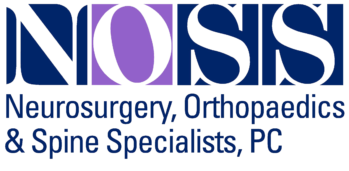Workplace Injury & Workers’ Compensation: steps after a job injury
Accidents can happen in any workplace – from office slips to warehouse falls to repetitive stress injuries caused by years of labor. If you’re injured while performing your job, the most important thing you can do is take swift and proper action to ensure your health and recovery.
At NOSS, we specialize in treating a wide range of job-related injuries and helping patients navigate the medical side of workplace incidents. Whether your injury is sudden or the result of long-term strain, here are the essential steps to take after being hurt at work.

Step 1: Report the Injury Immediately
No matter how minor your injury may seem at first, it’s essential to notify your supervisor or employer right away. Reporting the incident starts the documentation process and protects your right to access medical care. Waiting too long may complicate your ability to get treatment approved or benefits processed.
Be clear about the time, place, and nature of your injury when making your report. If you’re unsure whether your discomfort is work-related (such as pain that’s gradually worsened), it’s still important to report it and seek evaluation.
Step 2: Seek Medical Attention from an Authorized Provider
In most cases, your employer will direct you to a designated medical provider for evaluation. At NOSS, we are proud to be a trusted healthcare partner for work-related injury treatment. Our medical team includes specialists trained in diagnosing and treating:
- Back and neck injuries
- Joint pain and injuries
- Sprains, strains, and repetitive motion injuries
- Fractures and dislocations
- Nerve-related issues such as carpal tunnel syndrome
- On-the-job head injuries or impact-related trauma
Prompt diagnosis and documentation are crucial – not just for your health, but to help streamline the benefits process for you and your employer.
Step 3: Follow Through with Medical Recommendations
Once you’ve been evaluated, your provider will likely recommend a treatment plan that may include:
- Imaging (X-ray, MRI, or CT scan)
- In-office procedures
- Medication or injections to manage pain and inflammation
- Referrals to specialists or surgical consultation if necessary
- Activity modifications or temporary work restrictions
At NOSS, we prioritize conservative approaches when possible and coordinate closely with your case manager and employer to keep communication smooth and efficient. You’ll receive detailed documentation that helps support your claim and outlines any work limitations you may have during your recovery.
Step 4: Keep All Appointments and Records Organized
After a workplace injury, consistent follow-up is key. Keeping your appointments ensures proper recovery and gives your providers the chance to monitor your progress. It also helps avoid delays in care authorization or confusion about your medical status.
Bring your employer or case manager any medical documentation you receive during your visit. We provide clear, timely paperwork so the process stays on track and doesn’t add stress to your situation.
Step 5: Communicate Any Changes or Setbacks
If your symptoms worsen, if you’re struggling with new pain, or if your job duties are making recovery more difficult, let your medical provider know as soon as possible. At NOSS, our physicians are highly experienced in identifying workplace-related complications and adjusting your care plan to reflect your condition accurately.
Early intervention prevents small issues from becoming long-term setbacks – and ensures you’re not returning to work before you’re ready.
We’re Here to Help You Heal
Our role at NOSS is to support your medical recovery after a workplace injury. We understand the unique challenges these injuries can bring – not just physically, but emotionally and professionally. Our team is committed to clear communication, timely documentation, and expert care so that you can focus on getting better.
If you’ve experienced an injury at work, don’t wait to be seen. Let our experienced specialists guide your recovery and help you return to your everyday life – safely and confidently.

